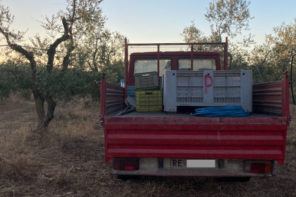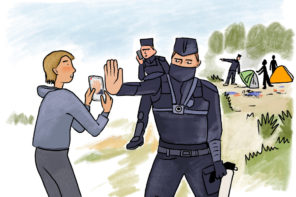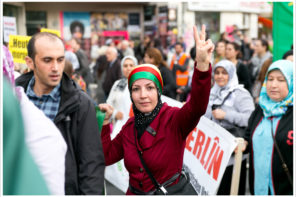Today Allegra’s #PublicationJihad continues our collaboration with POLAR: Political and Legal Anthropological Review with Part 2 of their list of publications to be reviewed (Part 1 available here). What this list thus offers is both a sneak preview of excitement still to come in POLAR, but also a summary of themes that have been ‘in the air’ over recent years.
Our eye was in particular caught by the following: the state and its transformation; violence & humanitarianism; documents and their affects and life cycles; and related to this last, the issue of borders. Both lists have provided significant inspiration for future Allegra posts, and thus we we look forward to reaping the rewards of this collaboration also in the time to come!
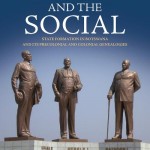
Botswana has been portrayed as a major case of exception in Africa—as an oasis of peace and harmony with an enduring parliamentary democracy, blessed with remarkable diamond-driven economic growth. Whereas the “failure” of other states on the continent is often attributed to the prevalence of indigenous political ideas and structures, the author argues that Botswana’s apparent success is not the result of Western ideas and practices of government having replaced indigenous ideas and structures. Rather, the postcolonial state of Botswana is best understood as a unique, complex formation, one that arose dialectically through the meeting of European ideas and practices with the symbolism and hierarchies of authority, rooted in the cosmologies of indigenous polities, and both have become integral to the formation of a strong state with a stable government. Yet there are destabilizing potentialities in progress due to emerging class conflict between all the poor sections of the population and the privileged modern elites born of the expansion of a beef and diamond-driven political economy, in addition to conflicts between dominant Tswana and vast other ethnic groups. These transformations of the modern state are viewed from the long-term perspectives of precolonial and colonial genealogies and the rise of structures of domination, propelled by changing global forces.
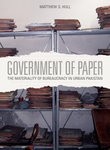
In the electronic age, documents appear to have escaped their paper confinement. But we are still surrounded by flows of paper with enormous consequences. In the planned city of Islamabad, order and disorder are produced through the ceaseless inscription and circulation of millions of paper artifacts among bureaucrats, politicians, property owners, villagers, imams (prayer leaders), businessmen, and builders. What are the implications of such a thorough paper mediation of relationships among people, things, places, and purposes? Government of Paper explores this question in the routine yet unpredictable realm of the Pakistani urban bureaucracy, showing how the material forms of postcolonial bureaucratic documentation produce a distinctive political economy of paper that shapes how the city is constructed, regulated, and inhabited.
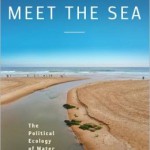
Where fresh water appears to be abundant and generally accessible, chronic pollution may be relatively ignored as a public issue. Yet there are those whose lives, livelihoods, and traditions are touched directly by the destructive albeit essential relationship between humans and water. In her passionate and persuasively argued Where Rivers Meet the Sea, Stephanie Kane compares two cities and nations—Salvador, Brazil and Buenos Aires, Argentina—as she tells the stories of those who organize in the streets, petition the courts, and challenge their governments to implement and enforce existing laws designed to protect springs, lakes, harbors, and rivers.

Drawing on unprecedented historical analysis of state archives, U.S. Congressional records, and other sources of overlooked data, Naturalizing Mexican Immigrants provides a rich understanding of the realities and rhetoric that have led to present-day immigration controversies. Martha Menchaca’s groundbreaking research examines such facets as U.S.-Mexico relations following the U.S. Civil War and the schisms created by Mexican abolitionists; the anti-immigration stance that marked many suffragist appeals; the effects of the Spanish American War; distinctions made for mestizo, Afromexicano, and Native American populations; the erosion of means for U.S. citizens to legalize their relatives; and the ways in which U.S. corporations have caused the political conditions that stimulated emigration from Mexico.
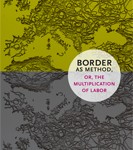
Far from creating a borderless world, contemporary globalization has generated a proliferation of borders. In Border as Method, Sandro Mezzadra and Brett Neilson chart this proliferation, investigating its implications for migratory movements, capitalist transformations, and political life. They explore the atmospheric violence that surrounds borderlands and border struggles across various geographical scales, illustrating their theoretical arguments with illuminating case studies drawn from Europe, Asia, the Pacific, the Americas, and elsewhere. Mezzadra and Neilson approach the border not only as a research object but also as an epistemic framework. Their use of the border as method enables new perspectives on the crisis and transformations of the nation-state, as well as powerful reassessments of political concepts such as citizenship and sovereignty.
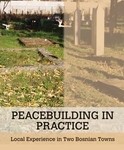
In November 2007 Adam Moore was conducting fieldwork in Mostar when the southern Bosnian city was rocked by two days of violent clashes between Croat and Bosniak youth. It was not the city’s only experience of ethnic conflict in recent years. Indeed, Mostar’s problems are often cited as emblematic of the failure of international efforts to overcome deep divisions that continue to stymie the postwar peace process in Bosnia. Yet not all of Bosnia has been plagued by such troubles. Mostar remains mired in distrust and division, but the Brcko District in the northeast corner of the country has become a model of what Bosnia could be. Its multiethnic institutions operate well compared to other municipalities, and are broadly supported by those who live there; it also boasts the only fully integrated school system in the country.Through a grounded analysis of localized peacebuilding dynamics in these two cities Moore generates a powerful argument concerning the need to rethink how peacebuilding is done—that is, a shift in the habitus or culture that governs international peacebuilding activities and priorities today.

Living in the northwest of Mexico, the Cucapá people have relied on fishing as a means of subsistence for generations, but in the last several decades, that practice has been curtailed by water scarcity and government restrictions. Where the River Ends is a moving look at how the Cucapá people have experienced and responded to the diversion of the Colorado River and the Mexican state’s attempts to regulate the environmental crisis that followed.

The Make-Believe Space is a book of ethnographic and theoretical meditation on the phantasmatic entanglement of materialities in the aftermath of war, displacement, and expropriation. “Northern Cyprus,” carved out as a separate space and defined as a distinct (de facto) polity since its invasion by Turkey in 1974, is the subject of this ethnography about postwar politics and social relations. Turkish-Cypriots’ sociality in a reforged geography, rid of its former Greek-Cypriot inhabitants after the partition of Cyprus, forms the centerpiece of Yael Navaro-Yashin’s conceptual exploration of subjectivity in the context of “ruination” and “abjection.” The unrecognized state in Northern Cyprus unfolds through the analytical devices that she develops as she explores this polity’s administration and raison d’être via affect theory. Challenging the boundaries between competing theoretical orientations, Navaro-Yashin crafts a methodology for the study of subjectivity and affect, and materiality and the phantasmatic, in tandem. In the process, she creates a subtle and nuanced ethnography of life in the long-term aftermath of war.
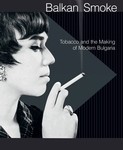
In Balkan Smoke, Mary Neuburger leads readers along the Bulgarian-Ottoman caravan routes and into the coffeehouses of Istanbul and Sofia. She reveals how a remote country was drawn into global economic networks through tobacco production and consumption and in the process became modern. In writing the life of tobacco in Bulgaria from the late Ottoman period through the years of Communist rule, Neuburger gives us much more than the cultural history of a commodity; she provides a fresh perspective on the genesis of modern Bulgaria itself.
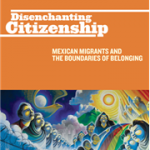
Central to contemporary debates in the United States on migration and migrant policy is the idea of citizenship, and—as apparent in the continued debate over Arizona’s immigration law SB 1070—this issue remains a focal point of contention, with a key concern being whether there should be a path to citizenship for “undocumented” migrants. In Disenchanting Citizenship, Luis F. B. Plascencia examines two interrelated issues: U.S. citizenship and the Mexican migrants’ position in the United States. Ultimately, he unearths citizenship’s root as a Janus-faced construct that encompasses a simultaneous process of inclusion and exclusion. This notion of citizenship is mapped on to the migrant experience, arguing that the acquisition of citizenship can lead to disenchantment with the very status desired. In the end, Plascencia expands our understanding of the dynamics of U.S. citizenship as a form of membership and belonging.
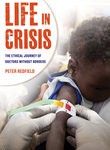
Life in Crisis tells the story of Médecins Sans Frontières (Doctors Without Borders or MSF) and its effort to “save lives” on a global scale. Begun in 1971 as a French alternative to the Red Cross, the MSF has grown into an international institution with a reputation for outspoken protest as well as technical efficiency. It has also expanded beyond emergency response, providing for a wider range of endeavors, including AIDS care. Yet its seemingly simple ethical goal proves deeply complex in practice. MSF continually faces the problem of defining its own limits. Its minimalist form of care recalls the promise of state welfare, but without political resolution or a sense of well-being beyond health and survival. Lacking utopian certainty, the group struggles when the moral clarity of crisis fades. Nevertheless, it continues to take action and innovate. Its organizational history illustrates both the logic and the tensions of casting humanitarian medicine into a leading role in international affairs.

The city of Nogales straddles the border running between Arizona and Sonora, Mexico. On the Mexican side, marginalized youths calling themselves Barrio Libre (Free ‘Hood) employ violence, theft, and bribery to survive, often preying on undocumented migrants who navigate the city’s sewer system to cross the US-Mexico border. In this book, Gilberto Rosas draws on his in-depth ethnographic research among the members of Barrio Libre to understand why they have embraced criminality and how neoliberalism and security policies on both sides of the border have affected the youths’ descent into Barrio Libre.
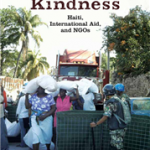
Set in Haiti during the 2004 coup and aftermath and enhanced by research conducted after the 2010 earthquake, Killing with Kindness analyzes the impact of official development aid on recipient NGOs and their relationships with local communities. Written like a detective story, the book offers rich enthnographic comparisons of two Haitian women’s NGOs working in HIV/AIDS prevention, one with public funding (including USAID), the other with private European NGO partners. Mark Schuller looks at participation and autonomy, analyzing donor policies that inhibit these goals. He focuses on NGOs’ roles as intermediaries in “gluing” the contemporary world system together and shows how power works within the aid system as these intermediaries impose interpretations of unclear mandates down the chain—a process Schuller calls “trickle-down imperialism.”

Resources for Reform explores how people’s lives intersect with the increasingly globalized and concentrated oil industry through a close look at Argentina’s experiment with privatizing its national oil company in the name of neoliberal reform. Examining Argentina’s conversion from a state-controlled to a private oil market, Elana Shever reveals interconnections between large-scale transformations in society and small-scale shifts in everyday practice, intimate relationships, and identity. This engaging ethnography offers a window into the experiences of middle-class oil workers and their families, impoverished residents of shanty settlements bordering refineries, and affluent employees of transnational corporations as they struggle with rapid changes in the global economy, their country, and their lives. It reverberates far beyond the Argentine oil fields and offers a fresh approach to the critical study of neoliberalism, kinship, citizenship, and corporations.
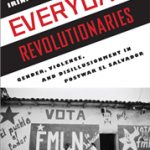
Everyday Revolutionaries provides a longitudinal and rigorous analysis of the legacies of war in a community racked by political violence. By exploring political processes in one of El Salvador’s former war zones – a region known for its peasant revolutionary participation – Irina Carlota Silber offers a searing portrait of the entangled aftermaths of confrontation and displacement, aftermaths that have produced continued deception and marginalization. Silber provides one of the first rubrics for understanding and contextualizing postwar disillusionment, drawing on her ethnographic fieldwork and research on immigration to the United States by former insurgents. With an eye for gendered experiences, she unmasks how community members are asked, contradictorily and in different contexts, to relinquish their identities as “revolutionaries” and to develop a new sense of themselves as productive yet marginal postwar citizens via the same “participation” that fueled their revolutionary action. Beautifully written and offering rich stories of hope and despair, Everyday Revolutionaries contributes to important debates in public anthropology and the ethics of engaged research practices.
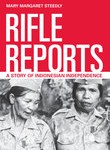
On August 17, 1945, Indonesia proclaimed its independence from Dutch colonial rule. Five years later, the Republic of Indonesia was recognized as a unified, sovereign state. The period in between was a time of aspiration, mobilization, and violence, in which nationalists fought to expel the Dutch while also trying to come to grips with the meaning of “independence.” Rifle Reports is an ethnographic history of this extraordinary time as it was experienced on the outskirts of the nation among Karo Batak villagers in the rural highlands of North Sumatra. Based on extensive interviews and conversations with Karo veterans, Rifle Reports interweaves personal and family memories, songs and stories, memoirs and local histories, photographs and monuments, to trace the variously tangled and perhaps incompletely understood ways that Karo women and men contributed to the founding of the Indonesian nation. This innovative historical study of nationalism and decolonization is an anthropological exploration of the gendering of wartime experience, as well as an inquiry into the work of storytelling as memory practice and ethnographic genre.
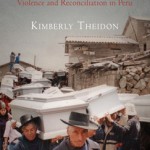
Drawing on years of research with communities in the highlands of Ayacucho, Kimberly Theidon explores how Peruvians are rebuilding both individual lives and collective existence following twenty years of armed conflict. Intimate Enemies recounts the stories and dialogues of Peruvian peasants and Theidon’s own experiences to encompass the broad and varied range of conciliatory practices: customary law before and after the war, the practice of arrepentimiento (publicly confessing one’s actions and requesting pardon from one’s peers), a differentiation between forgiveness and reconciliation, and the importance of storytelling to make sense of the past and recreate moral order. The micropolitics of reconciliation in these communities present an example of postwar coexistence that deeply complicates the way we understand transitional justice, moral sensibilities, and social life in the aftermath of war. Any effort to understand postconflict reconstruction must be attuned to devastation as well as to human tenacity for life.

Space of Detention is a powerful ethnographic account and spatial analysis of the “transnational gang crisis” between the United States and El Salvador. Elana Zilberg seeks to understand how this phenomenon became an issue of central concern for national and regional security, and how La Mara Salvatrucha, a gang founded by Salvadoran immigrants in Los Angeles, came to symbolize the “gang crime–terrorism continuum.” She argues that the contemporary fixation with Latino immigrant and Salvadoran street gangs, while in part a product of media hype, must also be understood in relation to the longer history of U.S. involvement in Central America, the processes of neoliberalism and globalization, and the intersection of immigration, criminal, and antiterrorist law. These forces combine to produce what Zilberg terms “neoliberal securityscapes.”
We wish to share – again – Polar’s review editor Ilana Gershon’s reminder for authors of forthcoming publications: if you think your book should be reviewed by Polar, make sure that your publisher is providing them with a review copy.





